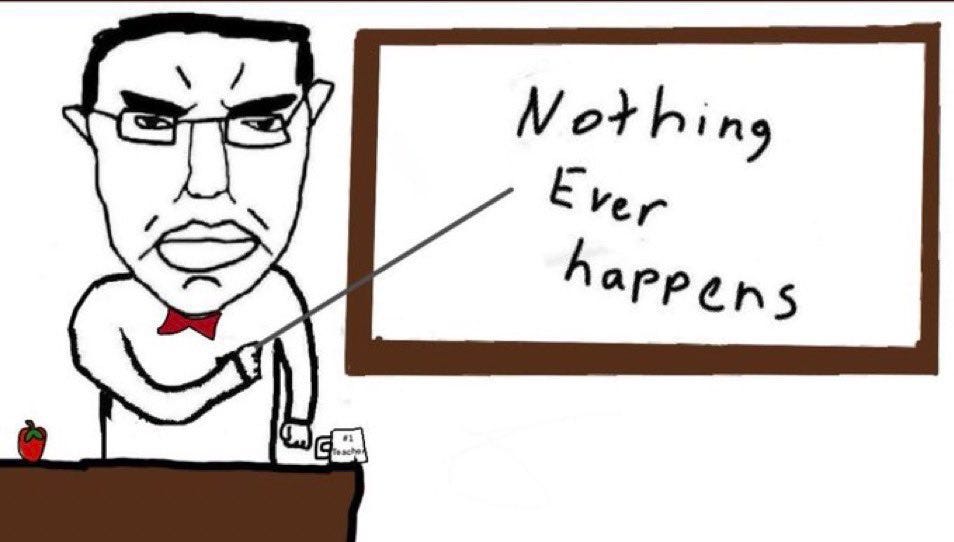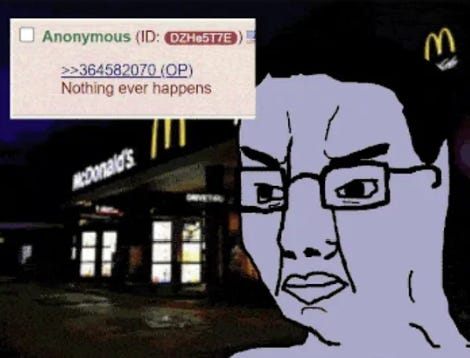For a fleeting moment this weekend, it appeared that something may indeed be occurring. Prigozhin was marching his troops into Moscow, a “coup” was underway. Would the streets turn into a crossfire battlefield? Would Putin be ousted? Would the Wagner Group seize the Russian throne? Less than 24 hours later all was put to rest. Some sort of peace deal was brokered, the hysterics of the day prior were proven unwarranted.
Another victory for subscribers to the “Nothing Ever Happens” doctrine.
The core principle of “Nothing Ever Happens” philosophy is that the incessant alarmism and doomerism around “seismic events” is almost always at best an overreaction and at worst totally false. Rather than a nihilistic blackpill, it’s actually a fairly good clearpill for maintaining sanity in times of information overload. Every few weeks/months it seems there’s a new “happening” that arises for people to get worked up about. “De-dollarization”, “Nuclear crisis”, “Economic collapse” and so on and so on… A perfectly rational response is to assume that whenever a journo/blogger/media outlet is insisting something is about to happen, they are likely incorrect and you can continue to go about your day. The real happenings tend to occur without much prelude.
What’s interesting though is the deep desire among many people for something truly earth-shattering to occur. The origins of the “Nothing Ever Happens” meme are from the archetypal chudjak being disappointed that there’s no nuclear holocaust so he has to go back to his McDonald’s job. Many such cases. Folks are looking for something (no matter how dire) to break up the day-to-day monotony.
There is riveting element to watching morbid events unfold. The first few weeks in March/April 2020 during the COVID outbreak were pretty thrilling drama. A new injection of uncertainty entered the equation of daily life. It was unclear how many were going to die, the stock market was moving up and down 10% in single days, millions entering remote work, local laws and lockdowns shifting on a daily basis. An exciting time of upheaval.
Natural disasters follow a similar arc. There’s an initial adrenaline rush with the storm hitting, people start getting sentimental about the nature of life and death. Sebastian Junger has wrote about how disaster events tend to briefly unite cities similar to the bond forged by soldiers in war. After World War II there were actually reports of some London civilians who missed the exciting days of the looming blitzkrieg. Over time of course the thrill wears off, your left in place to pick up the pieces of rubble and go on with your life.
The “Nothing Ever Happens” principle is really a good localist response to broader distant events that tend to dominate the headlines. With the internet now you can feel closer to things going on outside your community which have little impact on the typical daily life of a worker. Remember the doomsday predictions of Europe “freezing to death” last winter, this was a hot topic in the U.S. as well where there was clearly no immediate threat. It’s quite easy now to to be a “geopolitics expert” while at the same time not knowing anything that is going on your own neighborhood.
Everyday things are occurring, events “happening”, but its rare for them to truly touch the life of the average joe. A daily glance at a newspaper frontpage is probably more than enough news intake for most. There’s a happy peace to be found in just tuning-out focusing on your family, friends, and community and accepting that ‘Nothing Ever Happens'.








"It’s quite easy now to to be a “geopolitics expert” while at the same time not knowing anything that is going on your own neighborhood." Well said. Puts the absurdity in perspective.
I love it.
Thank you✨